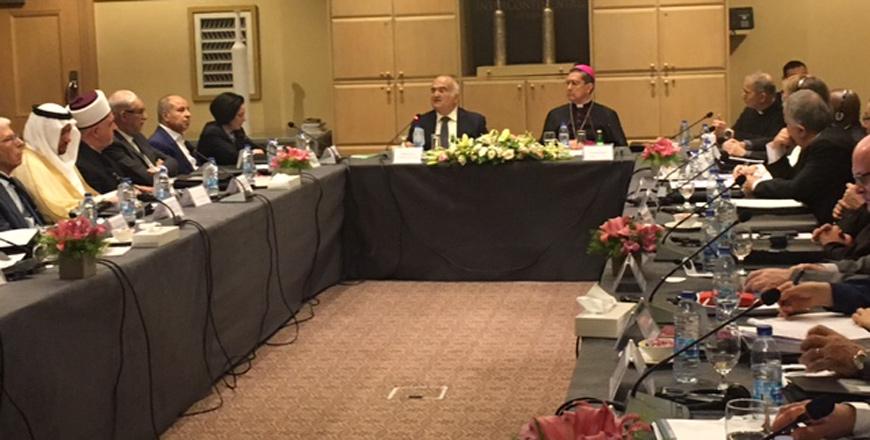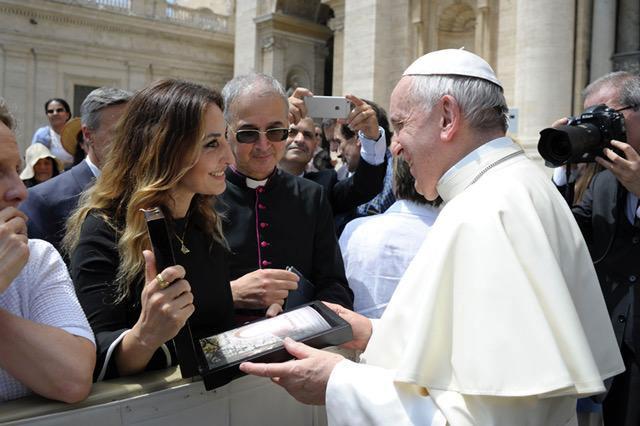You are here
Vatican priest stresses importance of interreligious dialogue
By Rula Samain - May 08,2018 - Last updated at May 08,2018
AMMAN — Interreligious dialogue refers to people of different faiths, both individual and institutional, coming to a mutual understanding and respect aiming to cooperate with each other and have positive interactions in spite of their differences, while remaining true to their own beliefs and respecting the beliefs of others, Vatican officials explained.
Monsignor Khaled Akasheh, head of the Islamic relations office at the Pontifical Council for Interreligious Dialogue (PCID) at the Vatican City on Monday gave a briefing about his 25 years service at the PCID.
He said that in dialogues, religious awareness is transformed form words into actions, and that the Jordanian heritage is rich of stories that reflect the mutual respect and coexistence between Christian and Muslims which should be documented.
Monsignor Akasheh, born in Karak Governorate, who speaks French, Italian and English beside his mother tongue, joined the PCID in 1994 holding the title as the secretary of the commission for religious relations with Muslims.
He stressed on the importance of creating "suitable" channels of cooperation between societies' establishments, mainly the academic institution, in order to promote the outcomes of interfaith conferences, “thus taking these conferences' outcomes to the practical level”.
In dialogue, there are four types, he explained, and mentioned the dialogue of life, mutual work, that of theology and the dialogue of spiritual experiences.
According the priest, the most important interreligious dialogue is the dialogue of life.
Monsignor Akasheh explained that the dialogue of life comes with a mission towards creating and maintaining peace between all faiths and, in the case of Jordan, it is between Muslims and Christians.
He told The Jordan Times that the need is to enhance the relationship between followers of different faiths.
“Believers, mainly Christians and Muslims, are called to be credible witnesses of God’s mercy and love for all humanity and of his care of the world in which we live.”
He added that the focus should be more on the youth to be educated and taught to respect and love others which “ will be a precious heredity we will leave them”.
During the seminar that was organised by the Catholic Centre for Studies and Media, Monsignor Akasheh talked about the “wounded humanity” quoting His Holiness Pope Francis.
“Humanity needs healing; this requires compassion, mutual pardon, and reconciliation, which are necessary conditions for genuine peace and shared values as well,” he said
Among the challenges he faced during his mission, Monsignor Akasheh said that “some wishes to hear what you do not wish to say”.
The Vatican priest briefed on the PICD efforts since it started in 1964 in promoting dialogue and paving the path of peace with different faiths around the world.
Monsignor Akasheh was ordained a priest in 1978, and from 1978 until 1982 he served as vicar in the Latin parish of Madaba Governorate, where later he was appointed to the Latin Patriarchal Seminary until 1993.
Related Articles
AMMAN — The reconstruction of the Levant requires in the first place the “institutionalisation of the human”, ensuring that the fundamental
AMMAN — Culture provides security and the base of human solidarity as well as social justice and acceptance of the other, according to HRH P
AMMAN — The Jordan Times’ reporter and author Rula Samain has presented a copy of her book “Fortress of Peace: Jordan’s Interfaith Drive and














